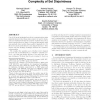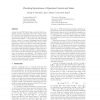10 search results - page 2 / 2 » Quantum One-Way Communication is Exponentially Stronger Than... |
STOC
2006
ACM
14 years 5 months ago
2006
ACM
We consider the problem of bounded-error quantum state identification: given either state 0 or state 1, we are required to output `0', `1' or `?' ("don't ...
CORR
2004
Springer
13 years 4 months ago
2004
Springer
We study the simultaneous message passing model of communication complexity. Building on the quantum fingerprinting protocol of Buhrman et al., Yao recently showed that a large cl...
STOC
2001
ACM
14 years 5 months ago
2001
ACM
One of the most intriguing facts about communication using quantum states is that these states cannot be used to transmit more classical bits than the number of qubits used, yet i...
ICCAD
2007
IEEE
14 years 1 months ago
2007
IEEE
Among the post-CMOS technologies currently under investigation, quantum computing (QC) holds a special place. QC offers not only extremely small size and low power, but also expon...
QUANTUMCOMM
2009
Springer
13 years 11 months ago
2009
Springer
Quantum key distribution (QKD) promises secure key agreement by using quantum mechanical systems. We argue that QKD will be an important part of future cryptographic infrastructur...


